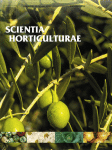Ver ítem
- xmlui.general.dspace_homeCentros Regionales y EEAsCentro Regional Entre RíosEEA ConcordiaArtículos científicosxmlui.ArtifactBrowser.ItemViewer.trail
- Inicio
- Centros Regionales y EEAs
- Centro Regional Entre Ríos
- EEA Concordia
- Artículos científicos
- Ver ítem
Heat treatment conditioning differentially affects the fruit quality and the carbohydrate metabolism during postharvest cold storage of two tangor (Citrus reticulata Blanco) cultivars: ‘Murcott’ and ‘W-Murcott’
Resumen
Citrus is highly susceptible to damage from cold temperatures, and conditioning procedures are commonly used to protect the fruit, and maintain its sensory qualities and external appearance. This study investigates the response of two tangor cultivars, 'Murcott' and 'W-Murcott,' to hot water conditioning treatment (HWT, 50 °C for 3 min) during the postharvest period (storage at 5 °C). The study analysed the internal quality parameters, metabolic profiles,
[ver mas...]
Citrus is highly susceptible to damage from cold temperatures, and conditioning procedures are commonly used to protect the fruit, and maintain its sensory qualities and external appearance. This study investigates the response of two tangor cultivars, 'Murcott' and 'W-Murcott,' to hot water conditioning treatment (HWT, 50 °C for 3 min) during the postharvest period (storage at 5 °C). The study analysed the internal quality parameters, metabolic profiles, and the activities of enzyme related to carbohydrate metabolism in tangor. The results indicate that there were no significant changes in soluble solids or titratable acidity after cold storage. 'Murcott' tangors experienced less weight loss compared to 'W-Murcott'. Additionally, in this variety the treatment led to an increase in ethanol concentrations, which is often associated with undesirable flavours. It could be observed that 'Murcott' undergoes significant carbon diversification to cellular destinations other than fermentation in the peel. These traits are further enhanced by heat treatment. Furthermore, this variety demonstrates a greater ability to preserve specific carbohydrate pool during the postharvest. 'W-Murcott' appears to be under more stressful postharvest conditions than 'Murcott'. This is indicated by the increased activity of ATP-saving enzymes (PPi-PFK, PEPC) and a lower ability to retain the level of relevant organic acids at the conclusion of the postharvest and shelf-life periods. These differences can mostly be attributed to varietal factors. Although 'Murcott' exhibited improved positive features due to HWT, the opposite trend was observed for 'W-Murcott'. In conclusion, although these two cultivars share a close genetic relationship, they respond differently to heat treatment.
[Cerrar]

Autor
Morales, Luisina Lourdes;
Margarit, Ezequiel;
Bello, Fernando;
Vazquez, Daniel Eduardo;
Podesta, Florencio Esteban;
Tripodi, Karina Eva Josefina;
Fuente
Scientia Horticulturae 329 : 112977. (April 2024)
Fecha
2024-04
Editorial
Elsevier
ISSN
0304-4238
1879-1018
1879-1018
Formato
pdf
Tipo de documento
artículo
Palabras Claves
Derechos de acceso
Restringido
 Excepto donde se diga explicitamente, este item se publica bajo la siguiente descripción: Creative Commons Attribution-NonCommercial-ShareAlike 2.5 Unported (CC BY-NC-SA 2.5)
Excepto donde se diga explicitamente, este item se publica bajo la siguiente descripción: Creative Commons Attribution-NonCommercial-ShareAlike 2.5 Unported (CC BY-NC-SA 2.5)


